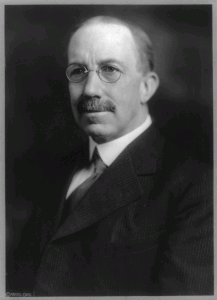I interviewed Dan Okrent some years ago when he was the embattled Public Editor at the New York Times and found him to be intelligent, keenly self-aware and a mordant wit. Okrent has just published a new book, Last Call: The Rise and Fall of Prohibition. I haven’t gotten my bony hands on a copy yet, but I just read an excellent excerpt in Smithsonian. Here’s a passage from Okrent about that insane and fascinating period and a forgotten historical figure who had great influence upon it:
“Wayne Wheeler was a small man, 5-foot-6 or 7. Wire-rimmed glasses, a tidy mustache, eyes that crinkled at the corners when he ventured one of the tight little smiles that were his usual reaction to the obloquy of his opponents—even at the peak of his power in the 1920s, he looked more like a clerk in an insurance office than a man who, in the description of the militantly wet Cincinnati Enquirer, ‘made great men his puppets.’ On his slight frame he wore a suit, a waistcoat and, his followers believed, the fate of the Republic.
Born on a farm near Youngstown, Ohio, in 1869, he was effectively born anew in 1893, when he found himself in a Congregational church in Oberlin, Ohio, listening to a temperance lecture delivered by the Rev. Howard Hyde Russell, a former lawyer who had recently founded an organization called the Anti-Saloon League (ASL). Wheeler had put himself through Oberlin College by working as a waiter, janitor, teacher and salesman. Now, after joining Russell in prayer, he signed on as one of the first full-time employees of the ASL, which he would turn into the most effective political pressure group the country had yet known.
It was, in fact, Wheeler who coined the term ‘pressure group.’ When he teamed up with Russell in 1893, the temperance movement that had begun to manifest itself in the 1820s had hundreds of thousands of adherents but diffuse and ineffectual leadership. The most visible anti-alcohol leader, Frances Willard of the Woman’s Christian Temperance Union (WCTU), had diluted her organization’s message by embracing a score of other issues, ranging from government ownership of utilities to vegetarianism. The nascent Prohibition Party had added forest conservation and post office policy to its anti-liquor platform. But Russell, with Wheeler by his side, declared the ASL interested in one thing only: the abolition of alcohol from American life.”
Tags: Dan Okrent, Wayne Wheeler

